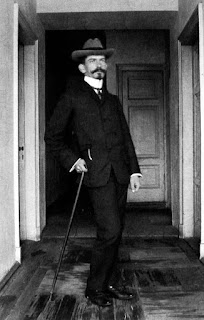Sources:
Treize années à la cour de Russie: Le tragique destin de Nicolas II et de sa famille, pages 88 to 90, by Pierre Gilliard, 1921
Thirteen Years at the Russian Court, pages 108 to 110, by Pierre Gilliard, translated by F. Appelby Holt, 1921
The diary entry:
Mercredi 5 août. — ... Le soir j'ai de nouveau une longue conversation avec l'impératrice qui ne peut pas admettre que je parte pour la Suisse.
— C'est absurde, vous n'y arriverez jamais, tous les chemins sont coupés.
Je lui dis qu'un arrangement est intervenu entre l'ambassade de France et la légation de Suisse et que nous partirons tous ensemble par les Dardanelles.
— Le malheur est que si vous aves quelque chance — fort minime d'ailleurs — d'arriver chez vous, vous n'en avez aucune de revenir ici avant la fin de la guerre. Et comme la Suisse ne se battra pas, vous resterez chez vous à ne rien faire.
En ce moment le Dr Dérévenko entra dans la salle où je me trouve avec Sa Majesté. Il tient à la main les journaux du soir qui annoncent la violation de la neutralité suisse par l'Allemagne.
— Encore! mais c'est fou, c'est insensé, s'écrie l'impératrice. Ils ont complètement perdu la tête.
Et comprenant qu'elle ne peut maintenant me retenir, elle n'insiste plus et se met à me parler avec bonté de mes parents qui vont être pendant si longtemps sans nouvelles de moi.
— Je n'ai moi-même aucune nouvelle de mon frère, ajoute-t-elle. Où est-il? En Belgique, sur le front français? Je tremble à la pensée que l'empereur Guillaume, par vengeance contre moi, ne l'envoie contre la Russie, il est bien capable de cette vilenie! ... Oh! c'est horrible la guerre! Que de maux, que de souffrances, mon Dieu! ... Que deviendra d'Allemagne? Quelle humiliation, quel écrasement! Et tout cela par la faute des Hohenzollern, par suite de leur orgueil fou et de leur ambition insatiable. Qu'ont-ils fait de l'Allemagne de mon enfance? J'ai gardé de mes premières années de si jolis souvenirs de Darmstadt, si poétiques, si bienfaisants et j'y avais de bien bons amis. Mais, lors de mes derniers séjours, l'Allemagne m'est apparue comme un autre pays, comme un pays inconnu et que je ne comprenais plus... Il n'y avait que les vieux avec lesquels je me retrouvais comme autrefois en communion de pensée et de sentiments. La Prusse a fait le malheur de l'Allemagne. On a trompé le peuple allemand, on lui a inculqué des sentiments de haine et de vengeance qui n'étaient pas dans sa nature... La lutte va être terrible, monstrueuse, et l'humanité marche au devant d'effroyables souffrances...
English translation (by Holt):
Wednesday, August 5th. — ... This evening I had another long talk with the Czarina, who will not hear of my leaving for Switzerland.
"It's ridiculous! You will never get there. All communications are interrupted."
I told her that an arrangement had been made between the French Embassy and the Swiss Legation, and that we should all go home together via the Dardanelles.
"The trouble is that, if you have some chance — it's a very small one — of getting home, you will have no chance of getting back here before the end of the war. As Switzerland will not fight, you will be at home doing nothing."
At that moment Dr. Derevenko entered the room. In his hand he held an evening paper announcing the violation of Swiss neutrality by Germany.
"Again! They must be crazy, mad!" cried the Czarina. "They have absolutely lost their heads!"
Realising she could not keep me now, she abandoned her resistance and began to speak kindly of my relations, who will be without news of me for some considerable time.
"I myself have no news of my brother," she added. "Where is he? In Belgium or on the French front? I shiver to think that the Emperor William may avenge himself against me by sending him to the Russian front. He is quite capable of such monstrous behaviour! What a horrible war this is! What evil and suffering it means! ... What will become of Germany? What humiliation, what a downfall is in store for her? And all for the sins of the Hohenzollerns — their idiotic pride and insatiable ambition. Whatever has happened to the Germany of my childhood? I have such happy and poetic memories of my early years in Darmstadt and the good friends I had there. But on my later visits Germany seemed to me a changed country — a country I did not know and had never known. ... I had no community of thought or feeling with anyone except the old friends of days gone by. Prussia has meant Germany's ruin. The German people have been deceived. Feelings of hatred and revenge which are quite foreign to their nature have been instilled into them. It will be a terrible, monstrous struggle, and humanity is about to pass through ghastly sufferings. ..."
Above: Alexandra.
Above: Pierre Gilliard.


No comments:
Post a Comment